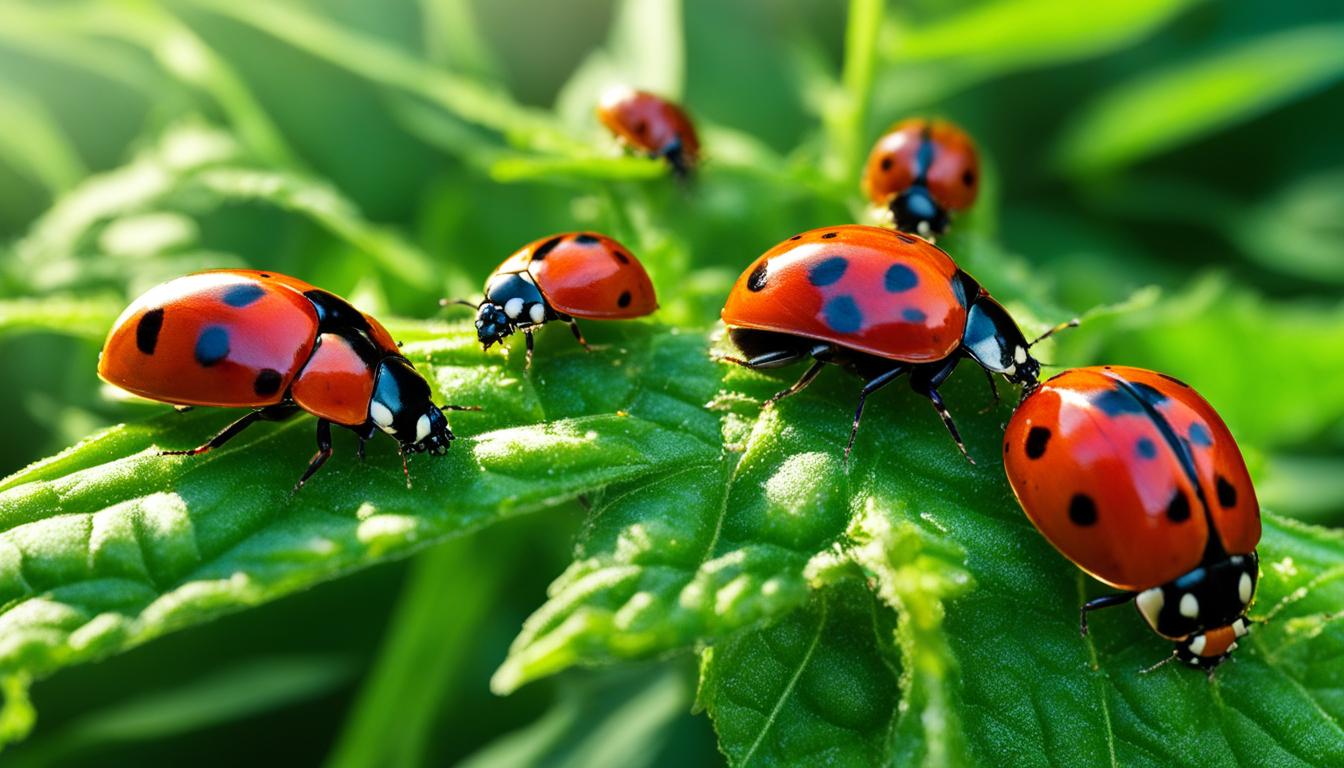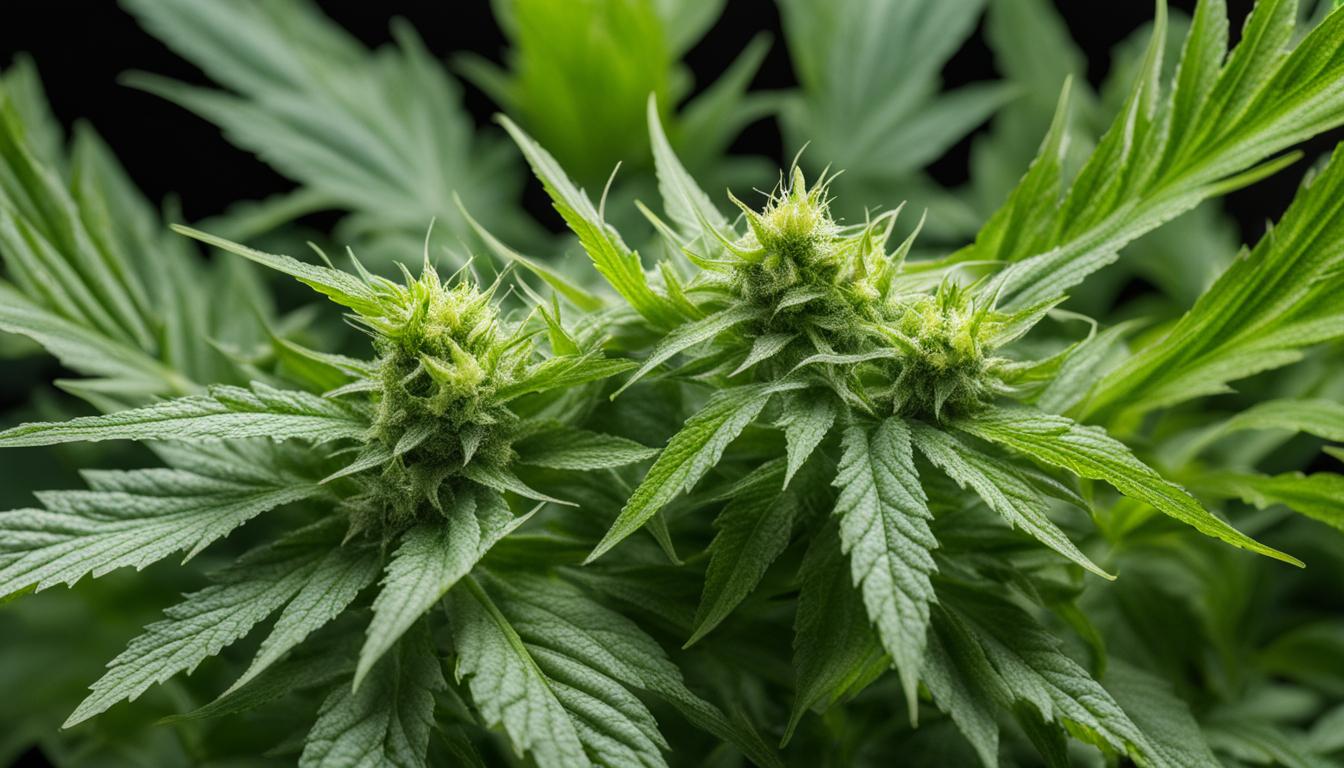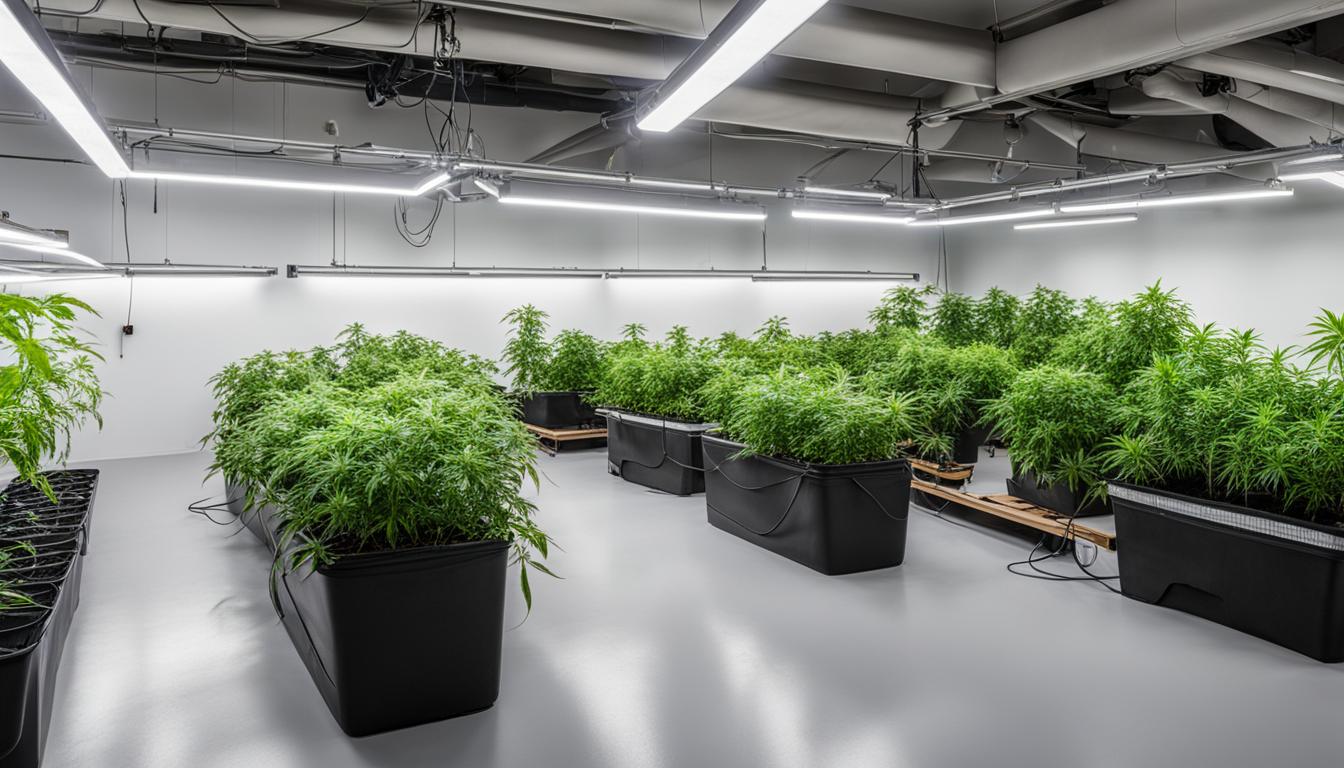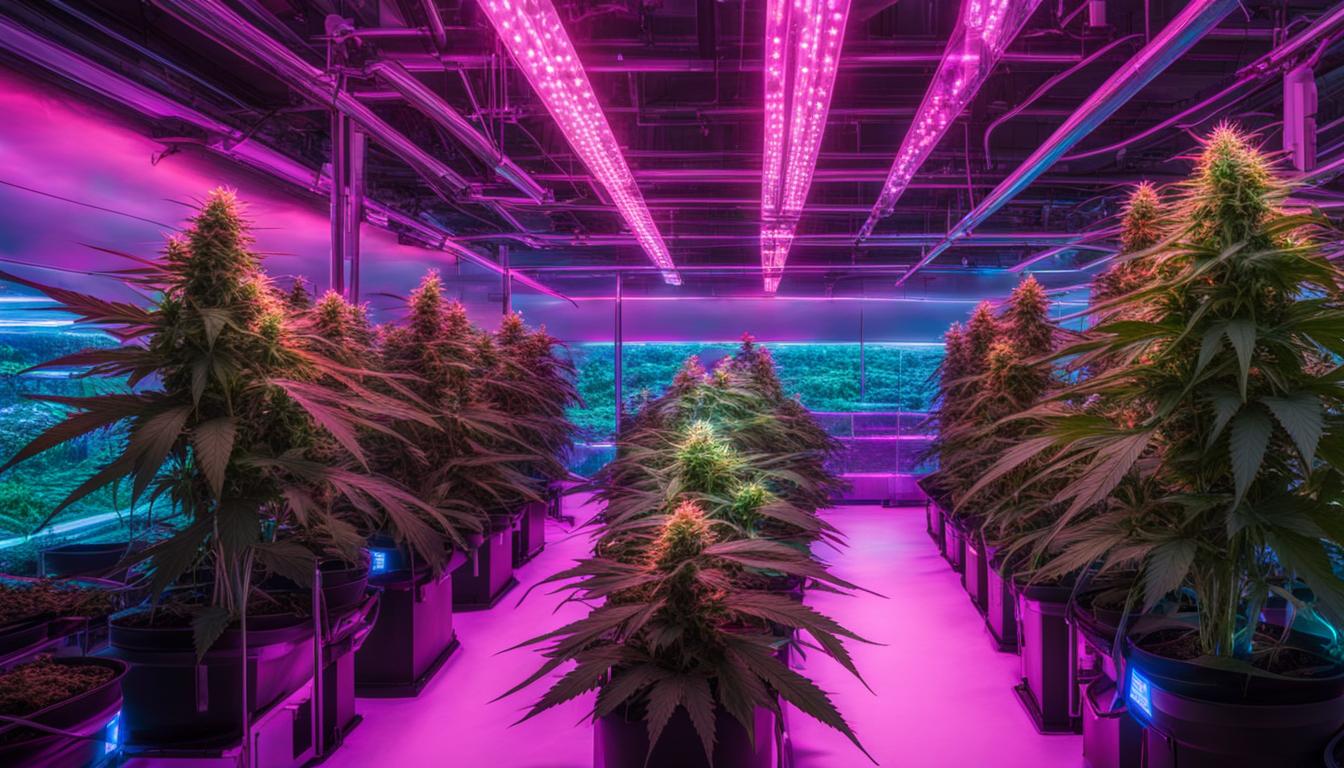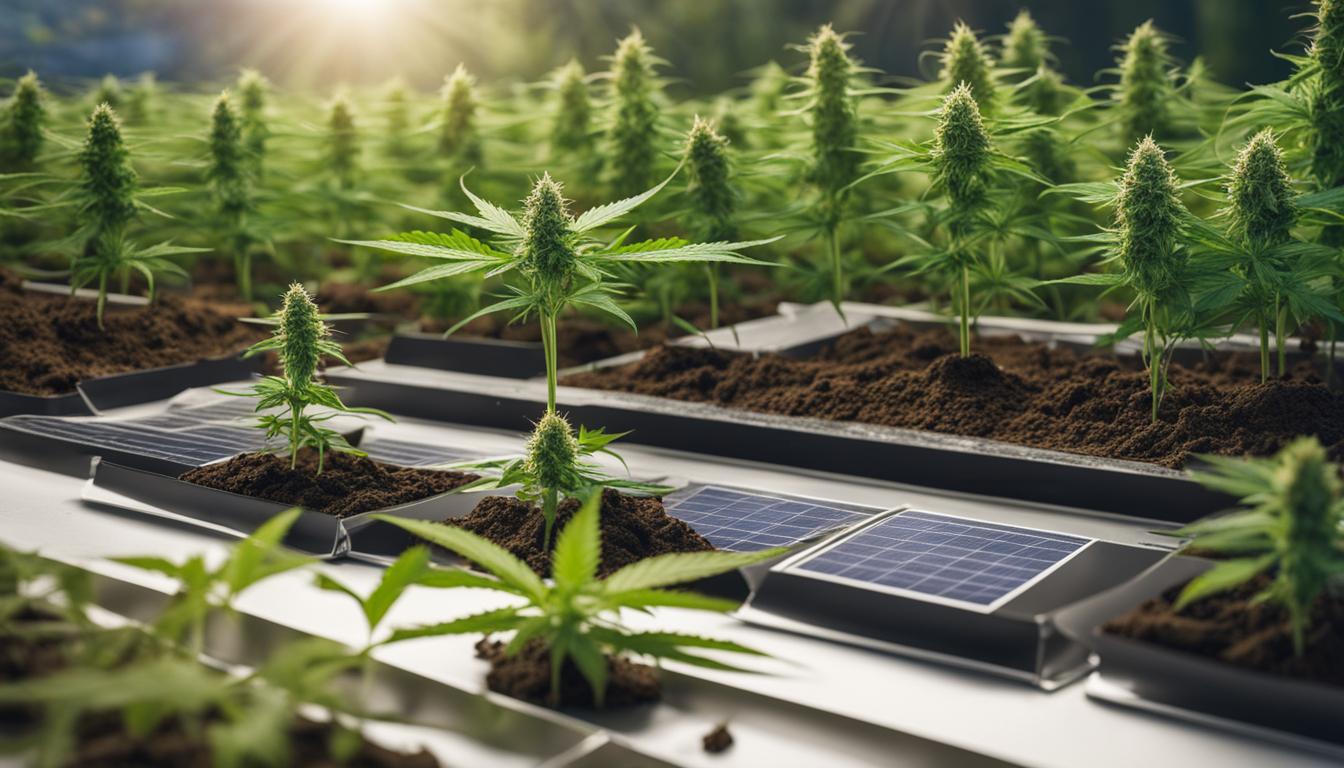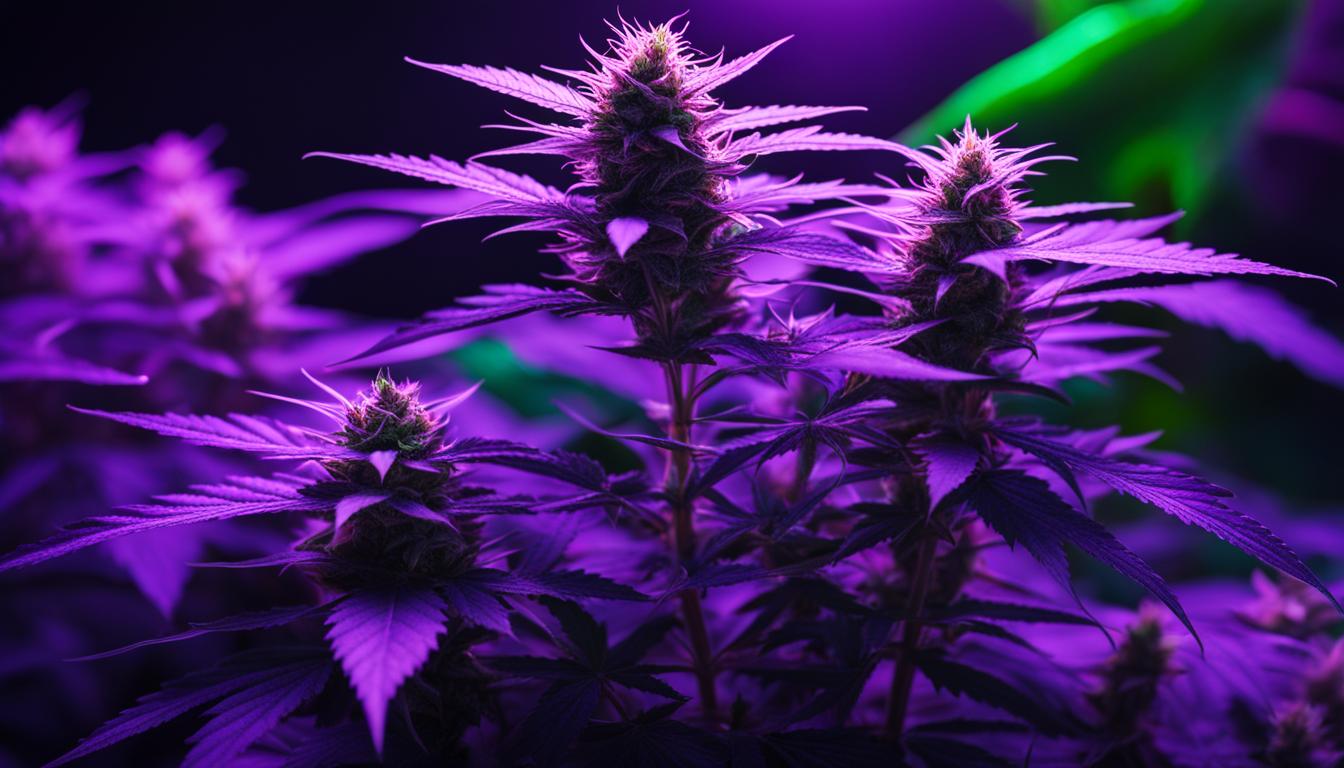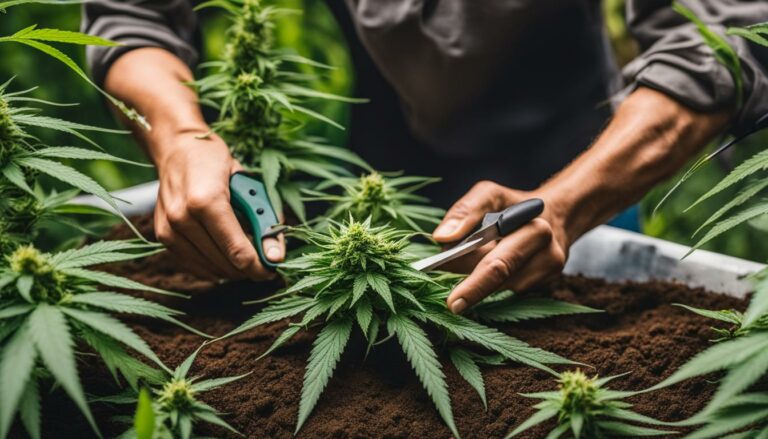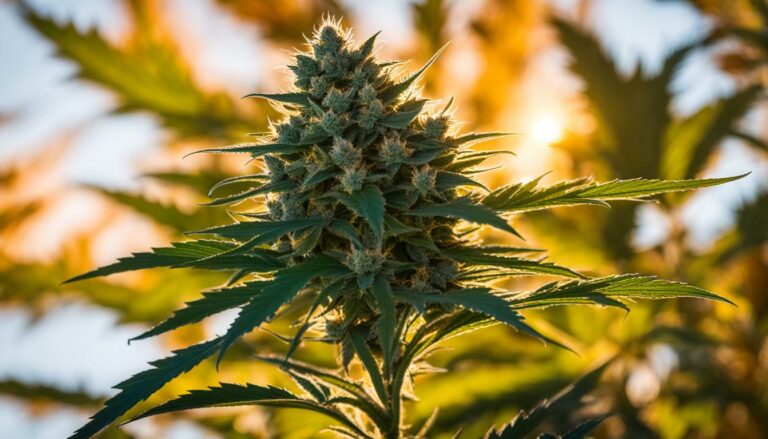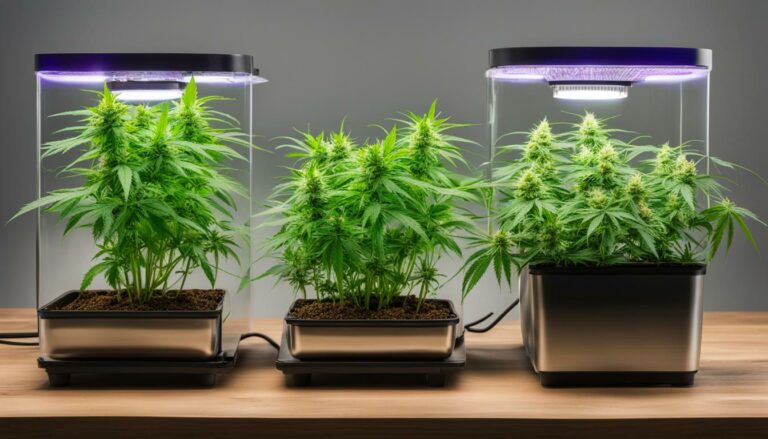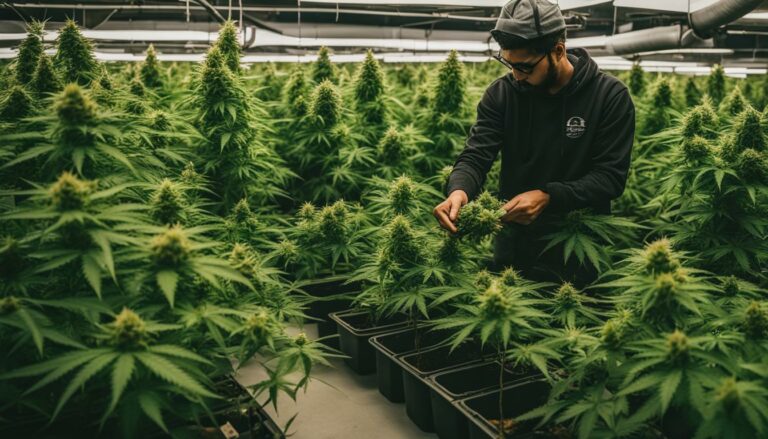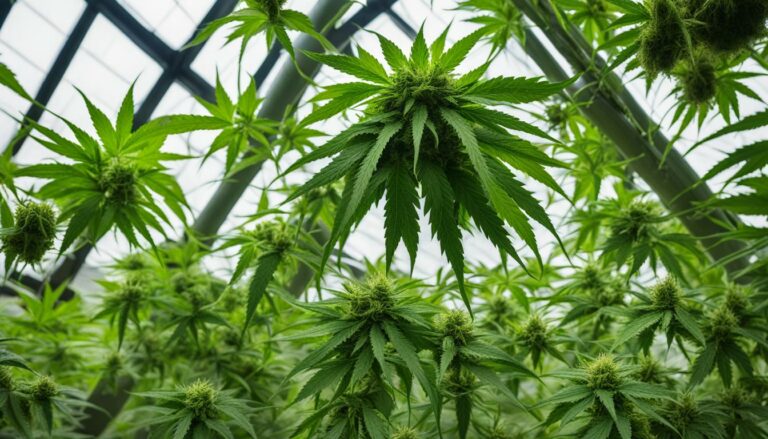Organic Pest Control Solutions for Cannabis
Organic cannabis pest control is more than just a method; it’s a way of nurturing and protecting our plants while preserving the purity of the final product. By implementing organic methods, we can harness the power of nature to effectively manage pests and promote the health and vitality of our cannabis plants. In this article, we will explore various organic pest control solutions specifically tailored for cannabis cultivation, including preventative measures, the use of beneficial insects, and homemade foliar sprays.
Organic pest control is not only about safeguarding our crops; it’s about embracing a holistic approach to cultivation. By prioritizing organic practices, we can create a balanced and harmonious ecosystem in our gardens, where beneficial insects thrive and pests are kept at bay. By taking this natural and sustainable route, we ensure our cannabis plants flourish without the need for harmful chemicals or pesticides.
Understanding Common Cannabis Pests
Cannabis plants are vulnerable to various pests that can adversely affect their health and productivity. It is crucial for cannabis growers to have a comprehensive understanding of these pests and their behaviors in order to develop effective pest control strategies. By identifying the specific pests that commonly plague cannabis cultivation, growers can take targeted actions to prevent and manage infestations, ensuring the success of their crops.
Common cannabis pests include thrips, whiteflies, spider mites, leaf miners, aphids, and cabbage loopers. These pests can cause significant damage to the plants, leading to stunted growth, reduced yield, and even the spread of diseases. Powdery mildew and fungal diseases are also a prevalent concern for cannabis growers. By recognizing the signs and symptoms of pest infestations, growers can promptly address the issue and implement appropriate pest control measures.
Understanding the characteristics and behaviors of these pests is essential in developing effective pest control strategies. For example, knowing that thrips are attracted to the color blue and that whiteflies are easily disturbed by gentle airflow can help growers design prevention and management strategies specifically tailored to these pests. By staying knowledgeable about common cannabis pests, growers can stay one step ahead and protect their plants from potential harm.
Common Cannabis Pests
| Pest | Description | Damage |
|---|---|---|
| Thrips | Small, slender insects that feed on plant sap and leave behind silver or bronze-colored scars | Deformed leaves, reduced growth, and transmission of plant viruses |
| Whiteflies | Small, winged insects that suck sap from the plants, leaving behind sticky honeydew | Yellowing leaves, stunted growth, and the spread of viral diseases |
| Spider Mites | Tiny arachnids that feed on plant sap, often causing yellow speckling on leaves | Discolored leaves, webbing, and reduced plant vigor |
| Leaf Miners | Insect larvae that tunnel through the leaves, leaving winding trails and causing leaf damage | Brown or yellow patches on leaves, reduced photosynthesis, and weakened plants |
| Aphids | Small insects that gather in large numbers and feed on plant sap | Distorted leaves, yellowing plants, and the spread of viral diseases |
| Cabbage Loopers | Caterpillars that chew on leaves, often leaving large holes | Defoliation, reduced yield, and compromised plant health |
With a solid understanding of the common pests that can infest cannabis plants, growers can implement proactive measures to prevent and manage infestations. By regularly monitoring plants for signs of pests, implementing proper sanitation practices, and adopting integrated pest management techniques, growers can protect their cannabis crops and ensure a successful harvest.
The Importance of Cannabis Pest Prevention
Pest prevention is a fundamental aspect of sustainable and organic cannabis cultivation. By prioritizing pest prevention, growers can establish a healthy growing environment that minimizes the risk of infestations. This approach not only protects the plants but also reduces the reliance on chemical pesticides, ensuring a safer and more natural final product.
One key element of cannabis pest prevention is maintaining optimal plant health and resistance. This starts with the soil, as healthy soil promotes robust plant immunity. Organic amendments such as neem seed meal and crustacean meal can naturally deter pests and improve soil quality. Incorporating aloe vera and silica in routine waterings or foliar sprays further strengthens a plant’s immune system, making it less susceptible to pest attacks.
Companion planting is another effective strategy for pest prevention in cannabis cultivation. By strategically planting certain varieties of plants next to cannabis, growers can create a diverse garden ecosystem that confuses and repels pests. Aromatic plants like lavender, basil, and sage emit scents that deter thrips, aphids, and beetles. Marigolds, with their vibrant flowers, act as visual and aromatic deterrents. Companion planting complements organic pest control by nurturing a balanced environment where pests are less likely to thrive.
Benefits of Cannabis Pest Prevention:
- Reduces the risk of pest infestations
- Minimizes the need for chemical pesticides
- Creates a healthier growing environment
- Promotes optimal plant health and resistance
- Ensures the safety and purity of the final product
By implementing sustainable pest control solutions and prioritizing pest prevention, cannabis growers can cultivate healthy and thriving plants while maintaining organic practices. The power of prevention lies in creating a balanced ecosystem, utilizing companion planting, and incorporating organic amendments to enhance plant immunity. With these proactive measures in place, growers can minimize the impact of pests and foster a more sustainable and harmonious relationship with their plants and the natural world.
Harnessing the Power of Beneficial Insects
In the realm of organic pest control for cannabis production, beneficial insects play a pivotal role in maintaining a healthy and balanced ecosystem. These natural predators offer an environmentally friendly and non-toxic solution to pest management. Ladybugs, for example, are formidable hunters that feed on aphids, spider mites, mealybugs, and whiteflies. Their voracious appetite and ability to reproduce rapidly make them an effective ally in combating pest infestations.
Lacewings are another valuable asset in the battle against cannabis pests. These delicate insects are known for their affinity for thrips, leafhoppers, and other harmful pests. They are particularly effective in greenhouse settings, where they can be introduced to establish a balanced ecosystem and keep pest populations in check.
By releasing beneficial insects into the garden, cannabis growers can harness the power of nature to naturally control pests. These eco-friendly allies not only eliminate the need for chemical pesticides but also promote the overall health and vitality of the plants. It is essential to choose the right beneficial insects for the specific pests affecting the cannabis crop, ensuring optimal conditions for their effectiveness. For environmentally conscious growers, embracing the power of beneficial insects is a sustainable and effective approach to pest management.
“By releasing beneficial insects into the garden, cannabis growers can harness the power of nature to naturally control pests.”
| Beneficial Insect | Pests Controlled | Preferred Growing Conditions |
|---|---|---|
| Ladybugs | Aphids, spider mites, mealybugs, whiteflies | Temperate climates, ample foliage, and a source of water |
| Lacewings | Thrips, leafhoppers, aphids, whiteflies | Greenhouse and outdoor settings, with access to nectar and pollen sources |
Table: Beneficial Insects for Organic Pest Control
Natural Remedies for Cannabis Pest Control
When it comes to organic cannabis cultivation, finding natural remedies for pest control is essential. By avoiding chemical pesticides, growers can maintain the integrity of their organic practices while effectively managing pests. Utilizing green pest control methods not only promotes a healthier environment but also ensures the safety of the final marijuana product.
One of the most popular natural remedies for cannabis pest control is neem oil. Derived from neem seeds, neem oil acts as a natural insecticide, targeting a wide range of pests including aphids, whiteflies, mites, and leaf miners. Its potent properties make it an effective solution for combating pests without harming beneficial insects or compromising plant health. By incorporating neem oil into a regular foliar spray routine, growers can create a protective barrier against pests throughout the cultivation cycle.
“Utilizing natural remedies like neem oil in cannabis pest control allows growers to protect their plants without relying on harmful chemicals. By embracing green pest control methods, cultivators can ensure the safety and quality of their organic marijuana crops.”
In addition to neem oil, garlic-based solutions offer another effective natural remedy for cannabis pest control. By harnessing the natural repellent properties of garlic, growers can deter pests while sparing beneficial insects like ladybugs. The strong scent of garlic acts as a powerful deterrent, keeping pests at bay without the need for toxic chemicals. Incorporating garlic-based foliar sprays into the pest control routine provides an eco-friendly and sustainable solution for organic marijuana crops.
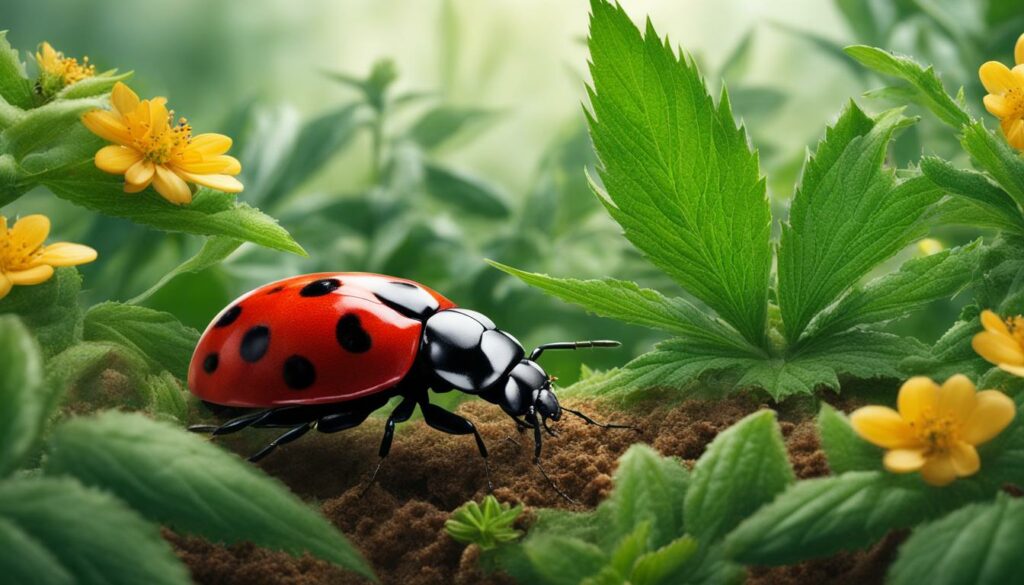
| Natural Remedies | Benefits |
|---|---|
| Neem Oil | – Natural insecticide – Targets a wide range of pests – Does not harm beneficial insects |
| Garlic-based Solutions | – Repels pests – Safe for beneficial insects – Eco-friendly and sustainable |
The Role of Companion Planting in Cannabis Pest Control
Companion planting is a powerful technique that can be used in cannabis cultivation to naturally deter pests and promote a healthy garden ecosystem. By strategically planting certain varieties of plants near cannabis, growers can create a diverse and dynamic environment that confuses and repels pests. Highly aromatic plants such as lavender, basil, sage, and rosemary are excellent choices for companion planting. Their strong scents can confuse pests like thrips, aphids, and beetles, making it harder for them to locate and infest cannabis plants. Furthermore, marigolds with their bright flowers can act as a visual and aromatic deterrent to pests, providing an added layer of protection.
Companion planting not only helps deter pests but also promotes beneficial insects in the garden. For example, planting flowers such as alyssum and yarrow can attract predatory insects like ladybugs and lacewings, which feed on harmful pests. This natural balance helps keep pest populations in check and reduces the risk of infestations. In addition, companion planting improves soil health and fertility by increasing biodiversity and providing habitat for beneficial microorganisms. It also enhances pollination, leading to better cannabis yields.
Incorporating companion planting into cannabis cultivation is an organic and natural approach to pest control. It reduces the reliance on chemical pesticides, ensuring the safety of the final product. By embracing companion planting, growers can create a harmonious and thriving garden ecosystem that supports the health and vitality of their cannabis plants.
The Benefits of Companion Planting in Cannabis Pest Control
- Deters pests: Companion planting with aromatic plants confuses and repels pests, making it harder for them to locate and infest cannabis plants.
- Promotes beneficial insects: Companion plants attract beneficial insects like ladybugs and lacewings, which feed on harmful pests and help maintain a natural balance in the garden.
- Enhances soil health: Companion planting increases biodiversity, improves soil fertility, and provides habitat for beneficial microorganisms, leading to healthier cannabis plants.
- Improves pollination: Certain companion plants attract pollinators and enhance the pollination process, resulting in higher yields for cannabis growers.
- Reduces reliance on chemical pesticides: Companion planting offers an eco-friendly alternative to chemical pesticides, ensuring the safety of the final product and promoting sustainable cultivation practices.
By integrating companion planting into cannabis pest control strategies, growers can embrace a holistic and natural approach to cultivation. It not only protects cannabis plants from pests but also contributes to a more sustainable and environmentally friendly growing environment. Companion planting is a powerful tool that harnesses the power of nature, ensuring the health and vitality of cannabis plants while promoting a balanced and thriving garden ecosystem.
| Companion Plants | Pests Deterred |
|---|---|
| Lavender | Thrips, aphids, beetles |
| Basil | Aphids, whiteflies |
| Sage | Carrot flies, cabbage moths |
| Rosemary | Carrot flies, cabbage loopers |
| Marigolds | Various pests |
Harnessing the Power of Predatory Insects
When it comes to eco-friendly pest management for cannabis, harnessing the power of predatory insects can be a game-changer. These natural predators, such as Stethorus punctillum beetles and Gaeolaelaps mites, can effectively control pest populations in outdoor and greenhouse settings, reducing the need for harmful chemical pesticides.
Predatory insects are particularly effective against common cannabis pests like spider mites, fungus gnats, and other harmful insects. By introducing these natural predators into the garden, growers can establish a balanced ecosystem where pests are kept in check by their natural enemies.
These natural predators feed on pests like spider mites, fungus gnats, and other harmful insects.
It’s important to choose the right predatory insect for the specific pest problem and ensure optimal conditions for their effectiveness. While predatory insects may not be suitable for indoor growers with limited space, they offer a powerful and natural solution for outdoor and greenhouse pest management.
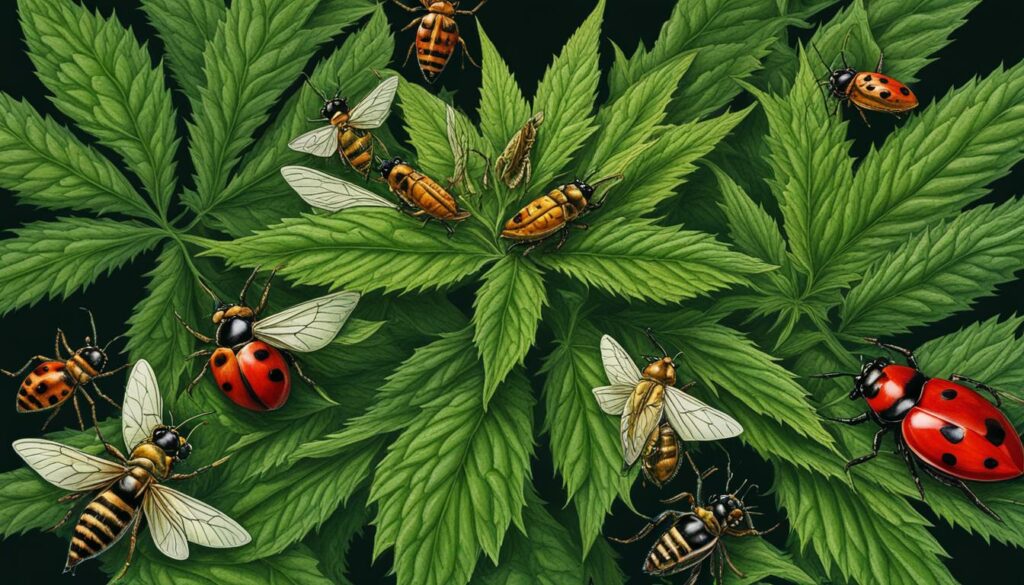
Predatory Insect Overview
| Predatory Insect | Pest Controlled |
|---|---|
| Stethorus punctillum beetles | Spider mites, aphids, thrips |
| Gaeolaelaps mites | Fungus gnats, springtails, root aphids |
| Green lacewings | Aphids, spider mites, thrips, leafhoppers |
By incorporating predatory insects into a holistic pest management strategy, cannabis growers can embrace natural solutions that promote overall plant health while minimizing the negative impact on the environment. It’s an eco-friendly approach that aligns with the principles of sustainable and organic cannabis cultivation.
Neem Oil as a Vegetative Growth Foliar Spray
During the vegetative growth stage of cannabis plants, it is crucial to implement organic methods for controlling cannabis pests. One effective and chemical-free option is using neem oil as a foliar spray. Neem oil, derived from neem seeds, acts as a natural insecticide that deters pests such as thrips, whiteflies, and aphids. By incorporating neem oil into a regular foliar spray routine, growers can effectively control pests and promote healthy plant growth.
Neem oil is safe to use and does not harm beneficial insects or impact the final product, making it an ideal choice for those practicing organic pest control for marijuana plants. The oil works by disrupting the feeding and reproductive patterns of pests, ultimately limiting their damage to cannabis plants. Additionally, neem oil has antifungal properties that can help prevent the occurrence of powdery mildew and other fungal diseases.
When using neem oil as a vegetative growth foliar spray, it is essential to thoroughly cover the leaves and stems of the plants. This ensures that the oil comes into contact with any present pests and provides maximum effectiveness. It is also important to follow the recommended application instructions and avoid spraying during the hottest parts of the day to prevent leaf burn.
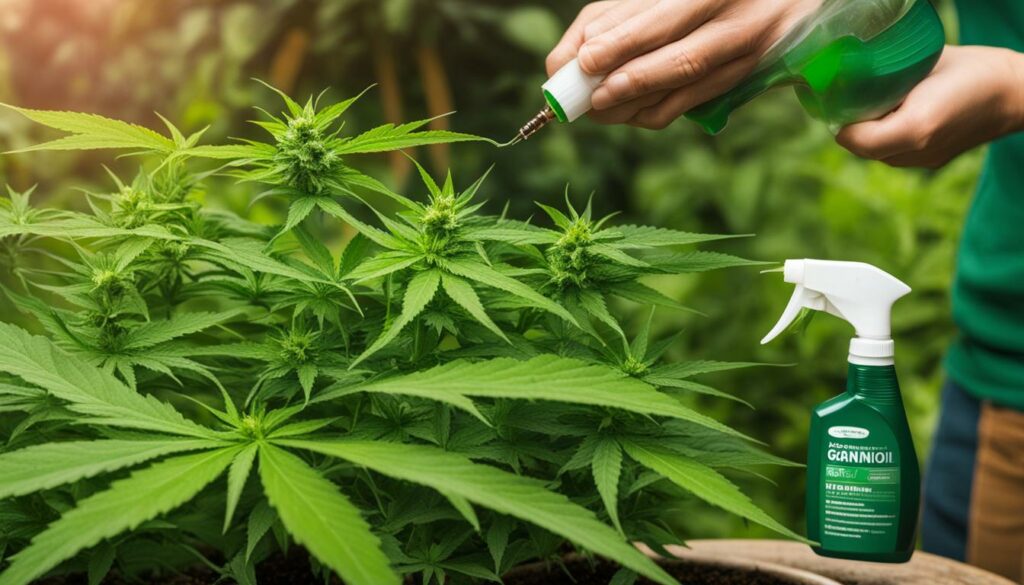
The Benefits of Neem Oil as a Vegetative Growth Foliar Spray
- Organic and Chemical-Free: Neem oil is a natural and eco-friendly pest control option that aligns with organic cultivation practices.
- Effective Pest Control: Neem oil acts as an insecticide against a wide range of pests, including thrips, whiteflies, and aphids.
- Safe for Beneficial Insects: Neem oil does not harm beneficial insects like ladybugs, which play a vital role in controlling pest populations.
- Prevents Fungal Diseases: Neem oil has antifungal properties that help prevent diseases like powdery mildew, ensuring the overall health of cannabis plants.
- Safe for Consumption: Neem oil residues on cannabis plants are considered safe and do not pose a risk to human health when consumed.
| Time of Application | Recommended Frequency | Dilution Ratio |
|---|---|---|
| Vegetative Growth Stage | Every 1-2 weeks | 1-2 tablespoons per gallon of water |
Organic Pest Control for Flowering Cannabis Plants
During the flowering stage of cannabis plants, it is essential to use a mild and organic foliar spray to protect them from pests without compromising the quality of the buds. Commercial neem oil sprays may be too potent for flowering plants, but there are alternative natural ingredients that can be used effectively.
A homemade foliar spray using gentle ingredients is recommended for this stage. Essential oils, such as peppermint, eucalyptus, and rosemary, can be mixed with water and sprayed onto the plants. These oils not only repel pests but also add a pleasant aroma to the garden. Another option is a garlic-based spray, which deters pests while not harming beneficial insects like ladybugs. These mild sprays help ward off bud worms (cabbage loopers) and other pests, ensuring the health and integrity of the cannabis flowers.
To summarize, when it comes to pest control during the flowering stage, it is crucial to choose a mild and organic foliar spray. By selecting the right spray for this stage and using gentle ingredients, growers can protect their buds from pests while maintaining organic practices.
The Power of Organic Foliar Sprays in Flowering Stage Pest Control
Organic foliar sprays play a vital role in pest control during the flowering stage of cannabis plants. They provide a natural and eco-friendly solution to ward off pests while preserving the quality of the buds. Unlike chemical pesticides, organic foliar sprays are safe to use and do not leave harmful residues on the plants.
“Organic foliar sprays offer a mild and effective form of pest control during the flowering stage of cannabis plants. With the right ingredients, growers can protect their buds from pests without compromising the overall quality of the flowers.” – Organic Cannabis Grower
By utilizing organic foliar sprays, cannabis growers can take a proactive approach to pest management while adhering to sustainable practices. These sprays, made from natural ingredients like essential oils and garlic, repel pests and deter infestations without harming beneficial insects or impacting the final product.
| Foliar Sprays for Flowering Stage Pest Control | Ingredients |
|---|---|
| Peppermint Oil Spray | Water, peppermint essential oil |
| Eucalyptus Oil Spray | Water, eucalyptus essential oil |
| Rosemary Oil Spray | Water, rosemary essential oil |
| Garlic Spray | Water, garlic cloves |
Using organic foliar sprays in the flowering stage promotes the health and vitality of the cannabis plants while ensuring a safe and high-quality final product. By embracing organic methods for pest control, growers can cultivate their cannabis in a sustainable and environmentally friendly manner.

Benefits of Organic Pest Control for Cannabis
Implementing organic pest control methods in cannabis cultivation offers numerous benefits for both the plants and the environment. By prioritizing eco-friendly pest management practices, growers can ensure the long-term sustainability of their crops while minimizing the use of toxic chemicals.
One of the key advantages of organic pest control is its non-toxic nature. Unlike conventional pesticides, organic methods do not pose a risk of harmful residues on the final product. This is especially important for cannabis, as consumers prioritize organic and chemical-free options. By adopting organic pest control, growers can provide a safer and healthier product for their customers.
Another benefit of organic pest control is its focus on promoting a balanced ecosystem. Organic methods encourage the presence of beneficial insects, such as ladybugs and lacewings, which act as natural predators of pests. By establishing a diverse and harmonious garden ecosystem, growers can reduce pest populations naturally, without disrupting the delicate balance of nature.
Furthermore, organic pest control aligns with the ethos of sustainable and responsible farming practices. By avoiding chemical pesticides, growers minimize their environmental impact and contribute to the preservation of biodiversity. Organic methods also prioritize the health and vitality of the soil, ensuring long-term fertility and sustainability of the land.
Benefits of Organic Pest Control for Cannabis:
- Non-toxic: Organic pest control methods do not leave harmful residues on the final product, ensuring a safer and healthier cannabis product for consumers.
- Balance ecosystem: By promoting beneficial insects and natural predators, organic pest control helps maintain a harmonious garden ecosystem and reduces the reliance on chemical pesticides.
- Sustainable practices: Organic pest control aligns with the principles of sustainable farming, minimizing environmental impact and preserving biodiversity.
- Healthier soil: Organic methods prioritize the health and vitality of the soil, ensuring long-term fertility and sustainability of the land.
By embracing organic pest control for cannabis cultivation, growers can not only protect their plants but also contribute to a greener and healthier future for the industry. It is an opportunity to cultivate cannabis in a way that respects nature’s balance, promotes sustainability, and delivers high-quality products to consumers.
| Benefits of Organic Pest Control for Cannabis | Description |
|---|---|
| Non-toxic | Organic pest control methods do not leave harmful residues on the final product, ensuring a safer and healthier cannabis product for consumers. |
| Balance ecosystem | By promoting beneficial insects and natural predators, organic pest control helps maintain a harmonious garden ecosystem and reduces the reliance on chemical pesticides. |
| Sustainable practices | Organic pest control aligns with the principles of sustainable farming, minimizing environmental impact and preserving biodiversity. |
| Healthier soil | Organic methods prioritize the health and vitality of the soil, ensuring long-term fertility and sustainability of the land. |
The Power of Nature in Cannabis Pest Control
Organic cannabis pest control harnesses the power of nature to protect plants sustainably. By implementing preventative measures, using beneficial insects, and creating homemade foliar sprays, growers can effectively manage pests without relying on harmful chemicals. This approach not only ensures the health and vitality of cannabis plants but also contributes to a more eco-friendly and sustainable cultivation practices. Embracing organic pest control encourages a harmonious relationship between growers and the natural world, fostering a balanced and thriving garden ecosystem.
When it comes to eco-friendly pest management for cannabis, organic methods provide a safe and sustainable alternative to conventional pesticides. By avoiding harmful chemicals, growers can protect the environment and reduce the risk of exposing consumers to pesticide residues. Organic pest control methods prioritize the use of natural ingredients and techniques that work in harmony with nature’s systems. This not only minimizes the ecological impact but also supports the overall health and resilience of the cannabis plants.
Green pest control for organic marijuana crops goes beyond just managing pests; it also involves nurturing a thriving ecosystem within the garden. By avoiding chemical pesticides, growers can encourage the presence of beneficial insects that play a crucial role in controlling pest populations. Ladybugs, lacewings, and other predatory insects can be introduced into the garden to naturally prey on common cannabis pests. This approach creates a balanced and self-sustaining ecosystem that reduces the need for external interventions. By working with nature rather than against it, growers can achieve long-term pest control while promoting a healthy and sustainable environment.

The power of nature in cannabis pest control lies in its ability to provide effective and sustainable solutions. By embracing organic methods, growers can protect their crops, the environment, and the consumers while fostering a deeper connection with the natural world. Green pest control for organic marijuana crops is not just a responsible choice; it is an opportunity to cultivate cannabis in harmony with nature, ensuring a healthier and more sustainable future for the industry.
Conclusion
Organic pest control is a vital component of successful cannabis cultivation. By embracing nature’s potency and utilizing a combination of preventative measures, beneficial insects, and homemade foliar sprays, growers can effectively manage pests while preserving the integrity of their cultivation practices.
Implementing organic methods not only protects the plants but also ensures the safety of the final product. By avoiding the use of harmful chemical pesticides, growers can create a healthier and more sustainable growing environment. Organic pest control promotes overall plant health, reduces the reliance on synthetic chemicals, and fosters a harmonious relationship between growers and the natural world.
Embracing organic pest control is not just a responsible approach, but also an opportunity to cultivate a deeper connection with nature. By working in harmony with the ecosystem, cannabis growers can protect their plants while contributing to a more eco-friendly and sustainable future. Organic pest control is the key to maintaining the health and vitality of cannabis plants, and it paves the way for a brighter and greener future in the world of cultivation.
FAQ
What is organic pest control?
Organic pest control refers to the use of natural methods and ingredients to manage pests in a sustainable and eco-friendly manner. It avoids the use of chemical pesticides and focuses on preventative measures, beneficial insects, homemade sprays, companion planting, and predatory insects.
Why is organic pest control important for cannabis cultivation?
Organic pest control is essential for maintaining the health and vitality of cannabis plants. It ensures the safety of the final product for consumption and avoids the harmful effects of chemical pesticides. Organic methods also support a balanced ecosystem and promote overall plant health.
What are some common pests that affect cannabis plants?
Cannabis plants can be susceptible to pests such as thrips, whiteflies, spider mites, leaf miners, aphids, cabbage loopers, powdery mildew, and fungal diseases. Understanding these pests’ characteristics and behaviors is crucial in developing effective pest control strategies.
How can I prevent pests in cannabis cultivation?
Prevention is key in successful pest control. Creating a healthy growing environment with optimal plant health and resistance is essential. Incorporating organic amendments, like neem seed meal and crustacean meal, and using aloe vera and silica enhance a plant’s immune system and deter pests.
How can beneficial insects help with pest control in cannabis cultivation?
Beneficial insects, such as ladybugs and lacewings, can be powerful allies in organic pest control. Ladybugs are predators of aphids, spider mites, mealybugs, and whiteflies, while lacewings feed on thrips, leafhoppers, and other pests. Releasing these natural predators establishes a balanced ecosystem that keeps pest populations in check.
What are some homemade foliar sprays for organic cannabis pest control?
Homemade foliar sprays can be highly effective in organic pest control. Neem oil acts as a natural insecticide against a wide range of pests, while garlic-based solutions deter pests without harming beneficial insects. Tomato leaf spray helps control aphids, and essential oil sprays repel pests. These sprays offer safe and non-toxic alternatives to chemical pesticides.
Can companion planting help with cannabis pest control?
Yes, companion planting involves strategically planting certain varieties of plants near cannabis to deter pests. Highly aromatic plants like lavender, basil, sage, and rosemary can confuse and repel pests. Marigolds act as visual and aromatic deterrents. Companion planting creates a diverse and dynamic ecosystem that reduces the likelihood of pest infestations.
How can predatory insects be used in cannabis pest control?
Predatory insects like Stethorus punctillum beetles and Gaeolaelaps mites can effectively control pest populations in outdoor and greenhouse settings. These natural predators feed on pests like spider mites, fungus gnats, and harmful insects. Predatory insects offer a powerful and natural solution for outdoor and greenhouse pest management.
Can neem oil be used as a foliar spray for cannabis?
Yes, neem oil derived from neem seeds can be used as a foliar spray during the vegetative growth cycle of cannabis plants. It acts as a natural insecticide, deterring pests like thrips, whiteflies, and aphids. Neem oil is safe to use and does not harm beneficial insects or impact the final product.
What type of foliar spray is recommended for flowering cannabis plants?
During the flowering stage, it is crucial to use a mild and organic foliar spray to avoid damaging the developing buds. Homemade solutions with gentle ingredients are recommended. Commercial neem oil sprays may be too potent, but essential oil sprays can be used to ward off bud worms without compromising the overall quality of the cannabis flowers.
What are the benefits of organic pest control for cannabis cultivation?
Organic pest control offers numerous benefits for cannabis cultivation. It avoids the harmful effects of chemical pesticides on plant health and the environment. Organic methods promote a balanced ecosystem, support beneficial insects, and ensure the safety of the final product, free from pesticide residues.
How does organic pest control harness the power of nature?
Organic pest control harnesses the power of nature to protect plants sustainably. By implementing natural methods and ingredients, growers can effectively manage pests without relying on harmful chemicals. This approach fosters a harmonious relationship between growers and the natural world, fostering a balanced and thriving garden ecosystem.

